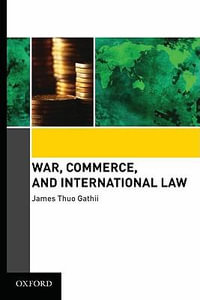Proportionality is intimately linked to the overarching concepts of self-defense, lawful force, and the controlled application of violence. It is one of the most visible facets of humanitarian law designed to reduce unnecessary human suffering and avoid excessive damage to property, and the natural environment. However, its application has come under renewed scrutiny and sustained controversy as a result of wars against non-state actors and from the extensive use of drones, human shields, cyber war techniques, and counterinsurgency tactics.
Proportionality in International Law critically assesses the law of proportionality in normative terms combining abstract philosophical and legal analysis with highly emotive contemporary combat cases. The principle of proportionality permits actions that are logically linked to the intended goal, and thus defines the permissible boundaries for the initiation and conduct of modern wars. The case studies discussed in this book are predominantly from the perspective of those who make decisions in the midst of armed conflict, bringing analytic rigor to the debates as well as sensitivity to facts on the ground. The authors analyze modern usages of proportionality across a wide range of contexts enabling a more complete comprehension of the values that it preserves. This book contrasts the applications of proportionality in both jus ad bellum (the law and morality of resort to force) and within jus in bello (the doctrines applicable for using force in the midst of conflicts).
Proportionality in International Law provides the reader with a unique interdisciplinary approach, offering practitioners and policymakers alike greater clarity over how proportionality should be understood in theory and in practice.
Industry Reviews
There are few topics in the law governing conflict more complicated and elusive than proportionality. Accomplished international lawyers struggle to grasp the important difference between application of the concept in the law of self-defense and international humanitarian law. Contemporary means and methods of warfare such as cyber-attack and the use of voluntary human shields have exacerbated the complexity modern decision-makers and warfighters face when
addressing real-world proportionality issues. Professors Newton and May have skillfully teased apart international law's variants of proportionality in a manner that is both accessible and sophisticated.
Of particular note is their interdisciplinary approach and use of real-world examples. I commend this work to scholars and practitioners alike.
Michael Schmitt
Charles H. Stockton Professor and Chairman, International Law Department, United States Naval War College
Professor of Public International Law, Exeter Univ
"Proportionality is a doctrine that every serious student of military force needs to study and understand. Its dynamics and tensions are remarkably consistent even as the specific details are so varied. Newton and May captured those issues superbly. Their organized and well-reasoned analysis gives this book an impressive depth of application and insight. Their conclusion that proportionality during armed conflicts is a unique usage highlights one of the
enduring conundrums of our era. This book fills the current void with intellectual consistency. It contains an interdisciplinary discussion that will help practitioners apply the doctrine of proportionality
in a manner consistent with the concerns of military commanders, and that also preserves lives."
-Justice Richard Goldstone, Former Chief Prosecutor of the International Criminal Tribunals for the former Yugoslavia and Rwanda, Constitutional Court of South Africa (ret'd)
"Proportionality is a pervasive concept in modern law and philosophy. Newton and May confront the danger that familiarity with the term makes its use formulaic and often flawed. The authors' careful interdisciplinary approach dissects the myriad concerns related to the modern practice of proportionality, and provides an invaluable analytical template for decision-makers. This book should be required reading for any military expert, international judge,
constitutional lawyer, human rights advocate, legislator, theologian, or philosopher who seeks to remain fully informed on the most important debates of our era."
-Michael P. Scharf, Acting Dean, Case Western Reserve University School of Law
"There are few topics in the law governing conflict more complicated and elusive than proportionality. The authors have skillfully teased apart international law's variants of proportionality in a manner that is both accessible and sophisticated. Of particular note is their interdisciplinary approach and use of real-world examples. I recommend this work to scholars and practitioners alike."
-Michael Schmitt, Charles H. Stockton Professor and Chairman, International Law Department, United States Naval War College Professor of Public International Law, Exeter University

























